Nature photo of the day: a bumblebee enjoying lungwort. Can anyone identify this particular bumblebee here?
when i was but a wee bumblebee my mother told me that i should frequent the honeysuckle bush over yonder where all the honeybees buzz about collecting so much pollen that they can hardly fly but i never had a hankering for it i am not sure why maybe it was too sweet for me or maybe i don't enjoy hanging out with the buzzing crowd however the flower i do relish diving into with my proboscis is lungwort it appears i have grown since my mother, the queen, taught me how to fly and forage and work and be independent for when i hover by a lungwort blossom it quivers under my wake and hangs to the ground when i land unlike when i was young but i still get my straw in there to get a taste of the delectable nectar within collecting as much as i can and then i soar over to the next flower or stumble in the air as some bees would put it either way, i go from lungwort bloom to lungwort bloom taking a tad from each and transporting the rest home to my hive this is what i do most days work, eat and sleep i am pretty sure that's what most humans do, too it seems that we are more alike than anyone thought - Csermely
Most of the cherries are done flowering by now, but there are still a few late bloomers, while the apple trees are just starting to open their first blossoms. In June the cherry trees will be filled with delicious little fruits, and a few months later, or more, the apple trees will produce something worth putting in jars. And in the cellar for fresh eating. While the oak trees are just beginning to send out timid leaves.
There’s your tree report for the week.
How are the trees by you? Are they blooming, shooting out leaves, or maybe losing them, depending on where you live? Have you taken time to notice the trees in your neighborhood?
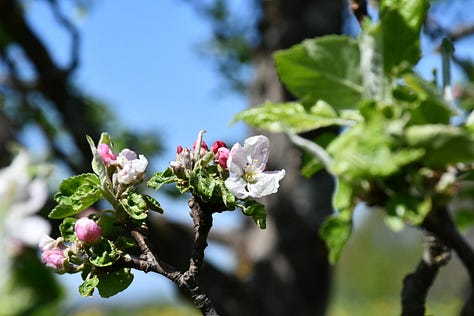
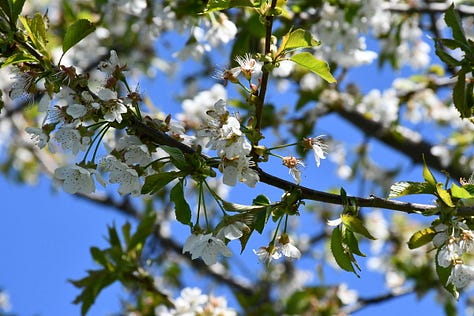
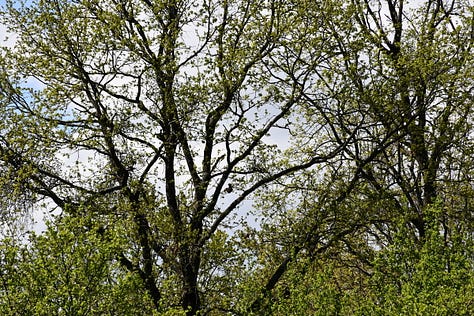
Bumblebees are a vital part of the ecosystem which should not be forgotten, as they usually are by people. Did you know that the average worker bumblebee only lives 4 weeks? They live in colonies and serve their queen, collecting nectar from all the flowers around - not just dandelions. Another fun fact is that they recognise people who matter to them.
So appreciate all the bumblebees you lay your eyes upon this summer. Let’s be honest, the modern human spends most of their time looking down at the their phone. And when their phone isn’t with them, some of them even experience nomophobia.
When humans started using transportable phones so much, they began to forget about everything else. Or at least thinking of everything else as less important. Humans also stopped noticing things outside of their phone, leading to car accidents, on one end of the spectrum, and not noticing, or caring about, bumblebees, flowers, mountains, or the sky on the other. Or anything else.
By extension, humans are also forgetting basic skills like foraging, or knowing how to identify and use wild and cultivated plants. Of course, there are still many who know how to forage today, while others don’t even know what chickweed is. Or how wondrous a plant it is.
Here is your reminder to not only look down, at your phone, or (rather) at bees and herbs, but to also seek the mountains in the distance. And to notice the clouds in the sky. Notice the shapes and the speed at which they travel, as well as the direction they are blowing.
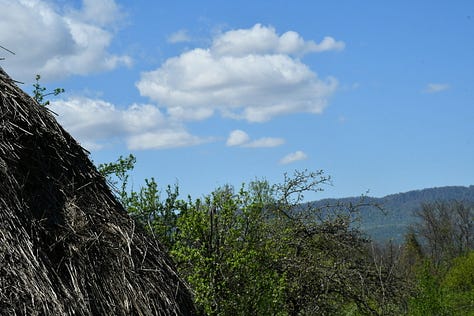
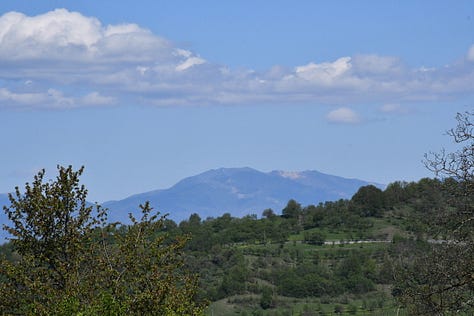
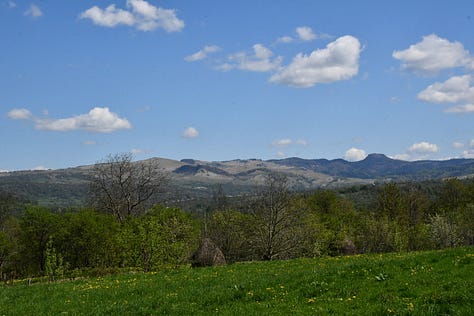
If you didn’t have a chance to celebrate Earth Day on Tuesday, do so today. For every day is Earth Day! So get outdoors and go for a walk. Your feet can take you almost anywhere.
They can carry you to the strip mall, but they can also take you on a hike, out into nature. Now is the time for us to spend as much time as we can in nature, thinking of it not as a destination to recharge for your next immersion in humanity, but as home. And your time spent in “society” as your time off from nature.
I believe that what we the people need the most these days is to care about noticing. Because even online, humans don’t look very hard at what they are seeing. Often times it seems that they don’t notice, or care, if something is real or not.
The same applies in nature. Observe every little detail outside. The trees, the insects on the flowers, the creek, and the clouds. Notice what is the same as it used to be, what is different, and what could be changed. Just be interested in something non-digital, and urge others to do the same.
As for the journal prompt of the day:
If I were a bee, what flowers would I land on? And what would the world look like if I was so tiny, compared to being a human?
Imagine being so small that a lungwort flower is a cornucopia in itself, and a cherry tree is an ocean of delicious nectar. How would being that size make you feel? Insignificant? Or maybe part of something much larger?
With gratitude,
There are still 3 days left to get grab your yearly discount of making Every Day Earth Day. Are you up for some more time in nature?
p.s. You’ll also receive the 24 digital issues of our Earth Gratitude Journal 💚


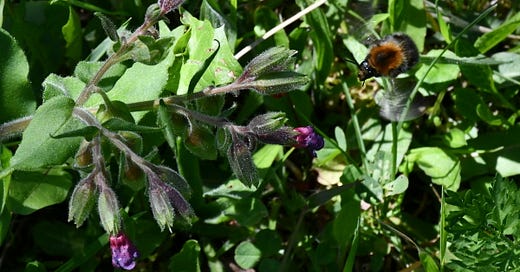




How wonderful to read about plants in other areas from real people (as opposed to reading about plants in a book) I live in northern NJ and most of the flowering trees are either at their peak or just past. We have a large chestnut tree in our backyard which gets huge buds in very early spring. Those buds unfold into a cluster of tiny leaves which very quickly become large leaf clusters. Next come small flower buds which grow on long spikes attached to the leaf clusters. Then, in quick succession the flower buds open into lovely little flowers all along the spike. In summer the large leaf clusters provide cool and welcome shade from the heat and sun as well as shelter from rain and thunderstorm. It is a wonderful tree and I give thanks for it daily.
I grew up in southern Illinois where the land is flat--no mountains in sight!-- and I would spend summer days just lying on my back on the grass watching the clouds. I could watch the thunderstorm coming in from the west and knew just when to run inside--unless of course I decided to stay outside and get wet ( a great way to cool off!) Unlike today’s parents who keep careful watch over their children and whose
children’s free time is programmed
and planned, my mother would send me out the door summer mornings and not expect to see me again until lunchtime and then after lunch I would be gone again, coming home for supper. I would ride my bike all day through miles of corn fields, exploring streams, forests, having absolutely delightful adventures, sometimes with a friend, but often alone. With no Google I had to rely on my assortment of Golden Nature Guides to identify the many and varied plants, insects, etc that I would discover. I’m sorry that my grandsons--and all children today-- don’t have that experience.
Thank you, Csermely, for your wonderful posts that generate such delightful comments.
Hi Csermely! You are learning a skill that will last you a lifetime. Every year I fall in love with a different plant. This year it is borage. For every tiny flower on this lovely bush, there is a very excited bee!🐝 So I have a bush of bees! They simply will not be distracted from their work. So I ask, "Pardon me, may I water?" I find this bond with my garden is about as strong as I could have with anyone or anything. I must visit every day! I must check and take stock of very minute change. And I learn, and I grow in plant wisdom, and my heart is calm and happy there. Multsu mesc, dear girl. Keep observing!
Andrea in Arizona 🌵